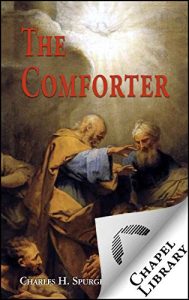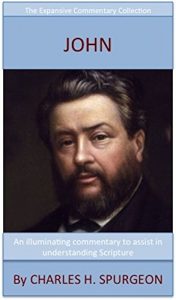Another quality eBook from Chapel Library.
“I will pray the father, and he shall give you another Comforter, that he may abide with you for ever.”—John 14:16
The unspeakable gift of the Son of God was followed up by the equally priceless gift of the Holy Ghost. Must it not be confessed by us that we think far less of the Holy Spirit than we should? I am sure we do not exalt the Saviour too much, nor is He too often the subject of our meditations; but at the same time, we give to the Holy Spirit a very disproportionate place, even as compared with the Redeeemer. I fear that we even grieve the Spirit by our neglect of Him.
Let me invite your devout contemplations to the special work of the Holy Spirit. Such an invitation is necessary. The subject has not grown stale, for it too seldom occupies our thoughts. We have not been unduly engrossed with honouring the Spirit of God, for this is a fault seldom or never committed. We have met with uninstructed persons who have glorified the love of Jesus beyond that of the Father, and there are others so occupied with the decrees of the Father as to cast the work of the Son into the background; but very few and far between must be those believers who have dwelt upon the doctrine of the Holy Spirit beyond its proper measure and degree. The mistake has almost invariably been made in the opposite direction.
The personal name of the Third Person of the Blessed Trinity is “the Spirit,” or the “Holy Spirit,” which words describe His nature as being a pure, spiritual, immaterial existence, and His character as being in Himself and in His workings pre-eminently holy. We commonly also speak of Him as the “Holy Ghost,” but the name is now an erroneous one. The word “ghost” was the same as “spirit” in years gone by, when the present translation of the Bible was made, but it does not popularly signify “spirit” now. Superstition has degraded the word from its elevated meaning, and it might be as well perhaps if the word were dropped altogether, and we confined ourselves to the more accurate word, “Holy Spirit.” The term “Holy Spirit” is His personal title, and we have in this verse His official title. He is in the English version called the “Comforter,” but the word used in the original, upon which we will meditate this morning, has a much wider range of meaning. The word is IIaraklhtos; we used it just now in our hymn, englishing it into “Paraclete”…
“I will pray the father, and he shall give you another Comforter, that he may abide with you for ever.”—John 14:16
The unspeakable gift of the Son of God was followed up by the equally priceless gift of the Holy Ghost. Must it not be confessed by us that we think far less of the Holy Spirit than we should? I am sure we do not exalt the Saviour too much, nor is He too often the subject of our meditations; but at the same time, we give to the Holy Spirit a very disproportionate place, even as compared with the Redeeemer. I fear that we even grieve the Spirit by our neglect of Him.
Let me invite your devout contemplations to the special work of the Holy Spirit. Such an invitation is necessary. The subject has not grown stale, for it too seldom occupies our thoughts. We have not been unduly engrossed with honouring the Spirit of God, for this is a fault seldom or never committed. We have met with uninstructed persons who have glorified the love of Jesus beyond that of the Father, and there are others so occupied with the decrees of the Father as to cast the work of the Son into the background; but very few and far between must be those believers who have dwelt upon the doctrine of the Holy Spirit beyond its proper measure and degree. The mistake has almost invariably been made in the opposite direction.
The personal name of the Third Person of the Blessed Trinity is “the Spirit,” or the “Holy Spirit,” which words describe His nature as being a pure, spiritual, immaterial existence, and His character as being in Himself and in His workings pre-eminently holy. We commonly also speak of Him as the “Holy Ghost,” but the name is now an erroneous one. The word “ghost” was the same as “spirit” in years gone by, when the present translation of the Bible was made, but it does not popularly signify “spirit” now. Superstition has degraded the word from its elevated meaning, and it might be as well perhaps if the word were dropped altogether, and we confined ourselves to the more accurate word, “Holy Spirit.” The term “Holy Spirit” is His personal title, and we have in this verse His official title. He is in the English version called the “Comforter,” but the word used in the original, upon which we will meditate this morning, has a much wider range of meaning. The word is IIaraklhtos; we used it just now in our hymn, englishing it into “Paraclete”…












